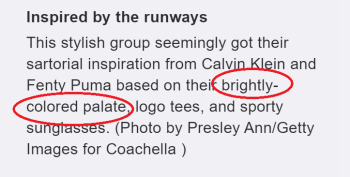I tried reading an article on Yahoo! Style, but I just can’t force myself to read beyond the first paragraph. It is so stunningly awful in its grammatical mistakes and ignorance of basic English, that I gave up. Here’s what I found with just a cursory examination of the ‘graph; I’m sure I missed a few things that merit attention:

My experience tells me that this writer is not a native English-speaker. Her mistakes are ones that are common with people who did not grow up speaking and writing English. But there’s no excuse for not providing her with a competent editor, if only to save her from embarrassments like these:
- 18 years old should be 18-year-old. He is 18 years old, but he is an 18-year-old model.
- instagram follower should be Instagram followers.
- on first name term seems to be a bastardization of on a first name basis.
- to loose his cherries for the first time is not just a vulgar expression, it’s kind of a stupid metaphor. First, she means lose, not loose. And one can only lose one’s cherry (which is singular) once. So I’m really confused as to what this is purported to mean. Maybe it just means the writer is both careless and ignorant.
- There’s a missing the in at Coachella music festival.
- will also be is redundant when one ends a sentence with too.
- been to famous music festival needs a the.
I’m sure I missed something, and I didn’t even touch on the run-on sentences. Please, Yahoo!, get this gal an editor!











